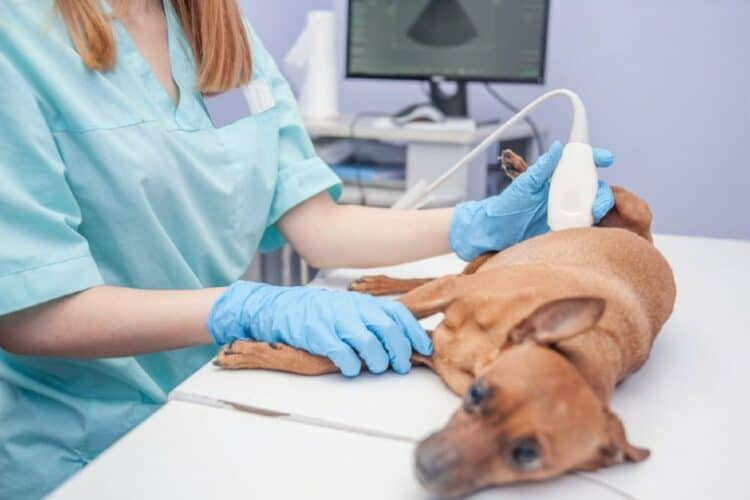An ultrasound is a commonly used diagnostic tool in veterinary medicine. It offers real-time imaging of internal structures without being overly invasive. However, it can be time consuming and often costs more than other diagnostic tools like X-rays. Let’s consider what you can expect to pay for an ultrasound on your dog.
The Importance of Ultrasounds
Ultrasound is the common name for a diagnostic test called ultrasonography. This imaging technique is 100% non-invasive, which is why many vets use it so frequently.
The image is created by reflecting high-frequency sound waves. Sound waves are bounced off your dog’s internal organs, and the echoes reflect the image that you see on the ultrasound screen.
While ultrasounds are most frequently associated with pregnancy, they are useful for diagnosing all sorts of other conditions. If you think about the accuracy of an ultrasound in producing an image of a fetus in utero, it’s easy to understand how it can produce an accurate view of other internal organs.
The best part about using ultrasound is that it doesn’t do any harm. You can view a dog’s insides and see what is going on without causing pain or risking their health.
Ultrasounds vs. X-rays
While both ultrasounds and X-rays are diagnostic imaging techniques, they are quite different. X-rays expose the patient to radiation, making an ultrasound safer.
X-rays use transverse electromagnetic waves that produce small amounts of radiation. While there aren’t likely to be any adverse effects with a single set of X-rays, most vets will try to minimize their use to circumstances when they are absolutely necessary, like for a broken bone. This means using other diagnostic tools whenever possible to reduce the overall exposure to radiation throughout your pet’s lifetime.

How Much Does an Ultrasound Cost for a Dog?
An ultrasound’s price depends on many factors, but here’s a general idea.
An ultrasound at a general practice vet will cost between $300 and $350. If your dog is at a veterinary specialist, it can cost between $400 and $500. This cost is in addition to the cost of the checkup, which can range between $100 and $300.
Additional Costs to Anticipate
Your location will significantly impact how much an ultrasound for your dog costs. Rural and small-town vets often offer diagnostic tools at a lower price than more specialized inner-city practices.
Your pup’s ability to tolerate an ultrasound is also important. If your dog requires sedation for the procedure, you should expect to pay more.
The other factor impacting the cost is what area of your dog’s body needs scanning. If your vet knows where they want to look, it will cost less than if they are searching for something. For example, if it’s a pregnancy ultrasound, it’s specific and targeted. If your dog has ingested a foreign body and the ultrasound is to search for where the offending object has landed, it will be more expensive. It’s more time consuming and requires scanning your dog’s lungs, stomach, intestines, etc.
Does Pet Insurance Cover an Ultrasound for a Dog?
Whether an ultrasound is covered by pet insurance depends on the type of coverage that you have. Pet insurance usually has two different types of coverage: accident-only coverage and wellness coverage.
If you have accident-only coverage, an ultrasound will only be covered if it’s needed due to an unexpected illness or accident and is part of your dog’s emergency care. Ultrasounds for routine care will not be covered.
With wellness coverage, ultrasounds may be covered, as this type of pet insurance covers accidents, illnesses, and routine wellness care. Each policy has different coverage conditions, so make sure to read yours carefully.

When Should My Dog Get an Ultrasound?
Ultrasounds are usually recommended for your dog if they are pregnant, have stomach issues, or have a blockage. It is likely that your vet will do a full physical exam, along with bloodwork, to narrow down the problem before doing an ultrasound.
Pregnancy
An ultrasound is the diagnostic imaging of choice for early pregnancy because it avoids exposing puppies to potentially harmful radiation. While ultrasounds aren’t always accurate at counting the number of pups, they are helpful in early pregnancy for confirming the condition.
If there are concerns about the number of pups that the mother dog is carrying, X-rays may be recommended in the latter stages of pregnancy to count them, as they are more accurate. Radiation is less likely to cause any harm in later pregnancy.
A dog pregnancy ultrasound costs between $300 and $500.
Abnormal Results
If your dog has abnormal results on other tests, like bloodwork or urinalysis, the vet may recommend an ultrasound to further aid in their diagnosis. Ultrasounds are often used to confirm diagnoses when there is a possibility of more than one illness causing the abnormal results.
For example, if your dog has an abnormal result on a urinalysis, this can indicate a problem with the kidneys or the bladder. An ultrasound can narrow it down. It is also one of the primary diagnostic tools for detecting cancer in dogs.
Foreign Object Ingestion
It’s common for dogs to eat things that they aren’t supposed to. As owners, we do our best to prevent this, but we’re not perfect, and dogs can get into odd things.
An abdominal ultrasound can be quite helpful in finding the location of an ingested foreign object. It can show whether it’s creating a blockage that needs further intervention or if it will pass through your dog’s digestive system normally.
Injury
Ultrasounds can help identify muscle and ligament injuries that don’t show up on X-rays. Knowing how your dog is injured is an important step in recovery and can prevent further problems in the future.
Heart Conditions
An echocardiogram is a special ultrasound used for diagnosing and monitoring heart conditions. The cost of this test varies but it is usually $500–$600.

Preparing Your Dog for an Ultrasound
In most cases, there is little to no preparation required for an ultrasound. You may be asked to withhold food and water for 8–12 hours before the procedure, so the vet can get an image unobstructed by food matter in your dog’s stomach.
Dogs that are high energy, can’t stay calm, or have anxiety or aggressive behavior at the vet may require sedation.
Additional Costs for Sedation
The type of sedation and the amount required to calm your dog will determine the overall cost. Over-the-counter sedatives cost between $10 and $90, so it doesn’t dramatically increase the cost of an ultrasound.
For veterinary sedation, the amount depends on your dog’s size. The cost of sedation is calculated every 30 minutes, and prices range from $60 to $100 per half hour.
Conclusion
Ultrasounds are useful diagnostic tools that are non-invasive and don’t expose your dog to radiation. While costs can vary according to location, the average cost of an ultrasound for a dog is $300–$500. You should be prepared to pay additional costs for a physical exam, other diagnostic tests, and sedation if it’s required.
Featured Image Credit: Shutterstock














